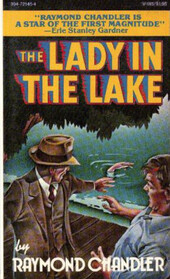The Lady in the Lake by Raymond Chandler
Review by Matt B. (BuffaloSavage)
This story features Chandler’s series protagonist, private eye Philip Marlowe. It takes place in California in 1942, so it has various references to smoking stands, cheese glasses, and colors like mulberry and light green. Playing a walk-on part in the climax are the safety measures brought about by the US entry into the Second World War.
Marlowe is hired by Derace Kingsley to find his wife. Kingsley is a well-off cosmetics executive. But scandal would get him fired. There’s no question of community property since his wife’s money – from bubbling crude in Texas – is hers alone. A wild child, she’s been missing for a month, with the only trace of her a bizarre telegram sent from El Paso asking for a divorce. Kingsley needs reassurance that she’s okay because he’s edgy about her getting busted due to her drunk and disorderly behavior and thrill-seeking hobby of shoplifting. Their love burned out some time ago.
With his characteristic realism and irony, Marlowe interviews a variety of curious characters: a womanizer with a violent streak, an drunk with esteem issues, a fluttery landlady, and a slow-talking small-town sheriff right out of the pulps, to name only a few. The brilliant narration is sprinkled with evocative descriptions of LA, Santa Monica (called Bay City in the book), San Bernardino and the mountain hamlet of Little Fawn Lake. The cops are portrayed as so vicious, corrupt and terrifying that one wonders if the police unions of the time complained to Chandler’s publishers.
In this book the reader will find the writing that made Chandler as respected as founder of noir Dashiell Hammett: well-wrought sentences, funny turns of phrase, and a crime story as a way to examine the human condition. Unlike in some other of his novels, Chandler does not over-write and doesn’t leave any gaps in the plot. The hard-boiled epigrams aren’t too corny or contrived. The overall tone isn’t callous or cynical nor is the world portrayed to be more dangerous and mean than it actually is.
It’s firmly in the classic mystery genre, with all the action pointing to a stunning reveal that leaves the reader gaping. I just didn’t expect such a brilliant resolution.


